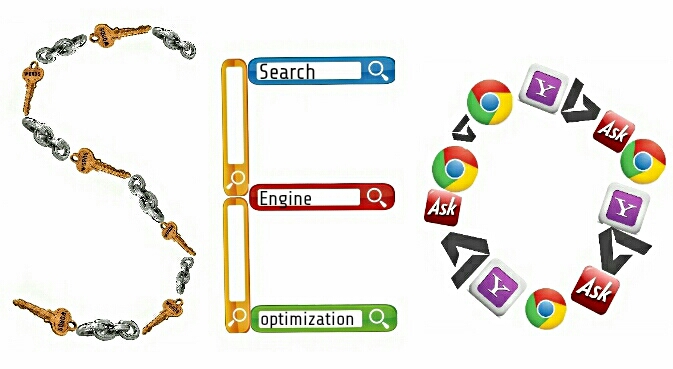This is a contributor’s blogpost …
Fifteen years ago if you’d mentioned SEO, all but the digital pioneers would probably just have stared blankly at you. Today it’s a huge growth industry with businesses of all shapes and sizes turning to consultants to enhance their visibility online through SEO or Search Engine Optimization. Good SEO can bring leads to your business in droves and bad SEO can lead them to sail right past you and into the arms of your competitors. With businesses becoming increasingly dependent on their search engine visibility, every entrepreneur needs at least a layman’s understanding of SEO whatever their line of business.
What determines SEO?
Some businesses treat SEO as a capricious God that can grant them fortune or destitution and, like the ancient societies of old, make huge cash sacrifices and hope for the best without any idea of how their money is being put to use. That’s not to denigrate the use of SEO consulting services. Not at all. As with all things, consulting an expert is never a bad idea. But even if you choose to outsource your SEO to a consultant, it’s still important to understand the principles of SEO and how it works.
Firstly, it’s important to realize that different search engines rank their search entries in different ways and while Google will undoubtedly be a leviathan that you’ll want to conquer, remember that Bing, Yahoo and AOL will have different priorities.
Broadly speaking, SEO ranking is determined by a range of on and off page factors. Some are creatively determined, some are coding issues. While entire books have been written on this, here are a few important factors:
- Keywords- Use of words that are included in common searches. These should be specific while avoiding jargon. For example “signs of skin cancer” will solicit more searches than “signs of melanoma”.
- Freshness- Web sites that post new content several times a day are far more visible than those who post fortnightly.
- Site architecture- User experience (UX) and the composition of your site are also important factors. Pages that users spend longer scrolling on are of greater value to search engines as are sites that take less time to load.
- Mobile Optimization- An increasing number of people are doing most of their web browsing through a mobile device and if you’re using a mobile-friendly platform you’ll have an inherent advantage over those that don’t.
-
Security- All search engines (but especially Google) want the Internet to be a safer place for URLs that use the Https prefix (the ‘s’ denotes a secure server) will be given priority over those that use Http.
-
Title tags- Just like the title of a book should give you an idea of the content, search engines need title tags to identify the subject matter of your content. Therefore your page titles need to be succinct and accurate, making use of carefully considered keywords.
Now that you know what search engines are looking for, let’s look at how you can draw their attention.
Paid vs Organic searches
Many businesses with little understanding of the nature of SEO look at paid and organic searches as though one is right and one is wrong. In reality, most businesses use both as part of a holistic campaign as each has their own inherent advantages and disadvantages. Paid SEO is pretty self explanatory. Businesses pay to have their content displayed for keyword searches. Organic search results occur when your site or page ranks highly on its own merits based on the criteria that search engines apply (as described above). While a Pay Per Click (PPC) campaign is useful as a ‘leg up’ on your SEO, there’s no excuse for not trying to grow your search engine visibility organically. Otherwise you’re just going to end up shovelling money into an un-fillable black hole.
Which brings us to…
PPC- It’s not an admission of defeat.
When you’re starting out amidst a sea of competitors, it can be virtually impossible to achieve a high search engine ranking organically. It can take months or even years to achieve high rankings and that presumes that you have the knowledge and resources to write enough SEO friendly content. Many startups will begin to advertise their presence with a PPC campaign based on carefully selected keywords as an opening jab, with which they then follow through with some organic techniques. We’ll now go through some ways in which you can grow your online following thereby organically increasing your SEO ranking and making your brand’s online presence unmissable.

Photo courtesy of Pixabay via Pexels
Content marketing
Content is king. It’s a tired slogan, to be sure, but it’s as true today as it was when Bill Gates said it in 1996. Companies that generate regular content currently generate 67% more leads than companies that don’t. Content marketing is not only a great way of broadening your reach, it’s a vital component in showing the world that your brand and voice are unique and showcasing the things that make you stand out amongst your competitors.
Let’s go over some content types that will be essential in bumping you up those search engine rankings.
Cornerstone content- Needless to say your cornerstone content should be the foundation on which your content strategy is based. Your cornerstone content will usually begin with a landing page with a compelling call to action. This is your opportunity to share what makes you and your brand unique with potential leads. Give them something for nothing. It may be in the form of a white paper or even an e-book. Whatever it is, it should be your manifesto, a go-to resource that’s packed with your own unique knowledge and insights. It should comprehensively detail everything that makes your business stand head and shoulders above your competitors..
Blogs and vlogs- Your blog should be your company’s mouthpiece and it’s the bread and butter of your daily content output. It’s where newcomers and brand advocates alike should go to follow the day-to-day story of your business. Blogging is not only a fun and therapeutic exercise, it’s a great way to ensure that you’re posting content regularly. You should be posting at least 4-5 days a week to ensure engagement, helping you crawl up those search engine rankings (though 2-3 times a day is the gold standard). After all, who’s going to visit a neglected blog with only two or three old posts?
Webinars- Webinars are a powerful medium for imparting your own unique knowledge and experience to an audience that can be as broad as you want it to be. It should be a virtual presentation that should not only be a platform for your business but also consider the content requirements of your follower base.

Photo courtesy of Kherrmann via Pixabay
Public speaking
When you have some webinars under your belt, public speaking is a highly effective way to follow it up. It’s a great way to grow awareness of your brand, while instilling a sense of knowledge, authority and passion that leads will associate with you and your business. Many entrepreneurs have a tendency to take their knowledge and expertise for granted, which is a shame because there are often huge numbers of people who would directly benefit from their sharing it. Don’t be one of those people! Modesty has no place when it comes to raising your business’ profile.
Seek out opportunities to speak at events such as product launches, conventions and seminars in order to get your face in front of a crowd. If you’re confident in your knowledge but feel nauseous at the prospect of speaking in front of an audience, then guest blogging can do the job just as well. This might also be an opportunity to work collaboratively with other brands and businesses which brings us to…
Sponsorship and co-branding
The brand recognition of others can be an incredible springboard for launching your business’ online presence. It’s relatively easy to find businesses and brands that would benefit from collaboration, reaching a mutually beneficial arrangement where you complement each other’s specialisms and capabilities.
Associating your business with branded tools for use by another business (such as pens, mugs, buttons, stickers, caps and t-shirts sporting your logo) is a great way of helping out a complementary business while exposing their customers to your brand.
Associating your brand with another established brand can also allow you to piggyback on their core follower base and authority, lending you a sense of legitimacy and a boost in public perception.
Cause advocacy
Supporting a good cause is its own reward, especially if it’s a cause that you’re personally passionate about. But did you know that it could also positively affect your bottom line? Cause advocacy as a lead generation strategy works great at building organic awareness of your brand, but that’s really just the tip of the iceberg. We live in the social media age and your public perception (especially in your early days, can be your undoing.
The cliche image of the greedy, self-interested, bean counting corporate exec (as ‘80s as the Betamax tape, mullets and shoulder pads) has become understandably toxic. For businesses, an ethical conscience is no longer a novelty, it’s a necessity. One needn’t look very far to find examples of corporations taken to task by the press, the public and even governments for actions that might be considered unethical, dishonest or avaricious and having their reputations besmirched as a result. Get yourself off to the best possible start by advocating causes and building positive associations with your brand.

